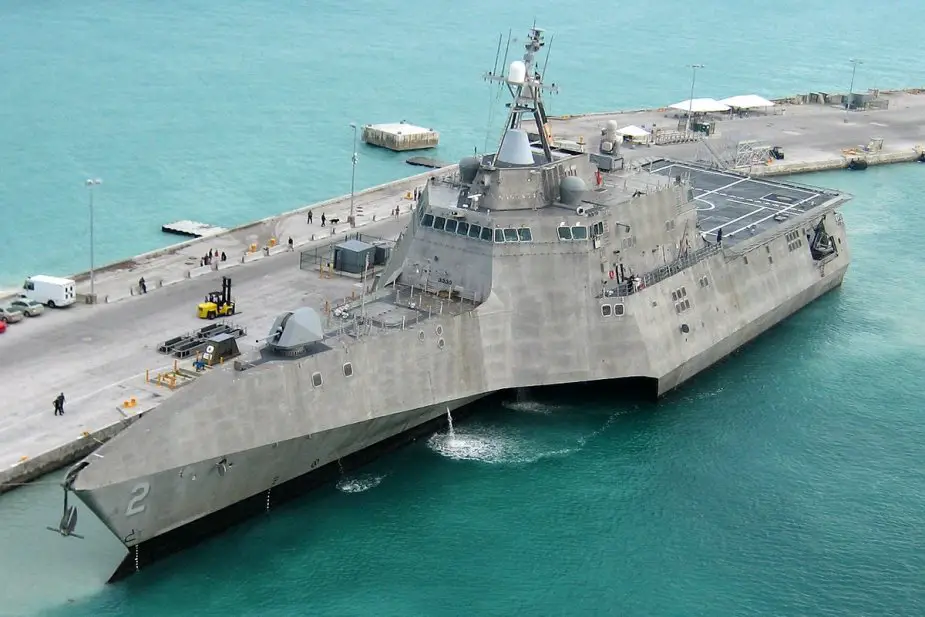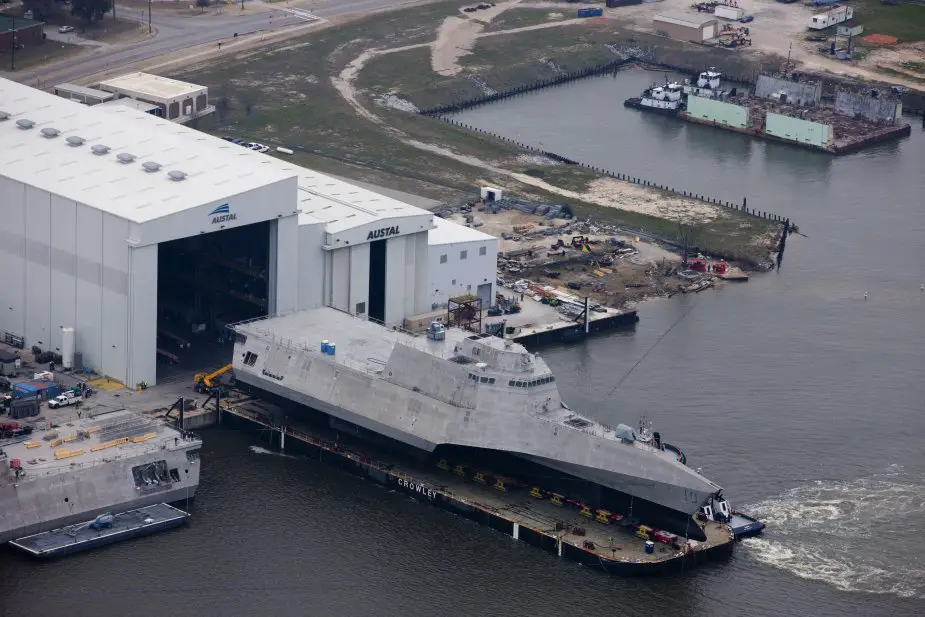Breaking news
Austal USA Awarded US$43M Littoral Combat Ship Contract Modification.
Austal Limited is pleased to announce that the United States Department of Defense has awarded Austal USA a modification to a previously awarded Littoral Combat Ship (LCS) contract. The modification provides Austal with a total potential additional value of US$43,362,000. Work is expected to be complete by June 2021.
Follow Navy Recognition on Google News at this link
 The U.S. Navy littoral combat ship USS Independence (LCS-2) arrives at Mole Pier at Naval Air Station Key West, Florida (USA), on 29 March 2010. Independence was on the way to Norfolk, Virginia (USA), for the commencement of initial testing and evaluation of the aluminium vessel before sailing to its homeport in San Diego, California (USA). (Picture source: US Navy)
The U.S. Navy littoral combat ship USS Independence (LCS-2) arrives at Mole Pier at Naval Air Station Key West, Florida (USA), on 29 March 2010. Independence was on the way to Norfolk, Virginia (USA), for the commencement of initial testing and evaluation of the aluminium vessel before sailing to its homeport in San Diego, California (USA). (Picture source: US Navy)
The contract modification exercises options for LCS Class design services, material to support LCS Class design services and the US Navy’s Integrated Data Product Model Environment (IDPME).
Austal will provide LCS Class design services to all LCS ships and services may include program management, fitting out services, change processing, software maintenance, engineering and lifecycle efforts.
Austal will also maintain an IDPME that shall enable Navy access to enterprise LCS data management.
This ASX announcement has been approved and authorised for release by David Singleton, Austal Limited’s Chief Executive Officer.
 An aerial view of the future littoral combat ship USS Gabrielle Giffords (LCS 10) during its launch sequence at the Austal USA shipyard. (Picture source: US Navy)
An aerial view of the future littoral combat ship USS Gabrielle Giffords (LCS 10) during its launch sequence at the Austal USA shipyard. (Picture source: US Navy)
About Austal's Independence-variant Littoral Combat Ship (LCS):
Austal's Independence-variant Littoral Combat Ship (LCS), developed for the US Navy, is a high-speed, agile, multi-mission combatant that delivers superior seakeeping and performance. The Independence-variant LCS is an open ocean capable vessel but is designed to defeat growing littoral threats and provide access and dominance in the coastal water battlespace.
A fast, maneuverable and networked surface combatant, the Independence-variant LCS provides the warfighting capabilities and operational flexibility to accomplish multiple, critical missions including mine warfare, anti-submarine warfare and surface warfare with inherent capabilities that also support missions such as special operations and maritime interdiction.
Independence-variant LCS delivers combat capability from core self-defense systems in concert with rapidly interchangeable, modular mission packages and an open architecture command and control system. The Independence variant's aviation facilities and watercraft launch and recovery capability support focused mission packages are outfitted with both manned and unmanned air, surface, and sub-surface vehicles. A mission bay and three weapons modules provide support service interfaces between mission package weapons, sensors and vehicles and the sea frame.
Modularity maximizes the flexibility of LCS and enables commanders to meet changing warfare needs, while also supporting faster, easier technological updates. LCS is networked to share tactical information with aircraft, ships, submarines, joint and coalition units both at sea and on shore, and with LCS operating groups.
The trimaran construction is unique to the US Navy and lends the Independence-variant some unique capabilities and seakeeping characteristics. Its flight deck is the largest of any current US Navy surface combatant, and its hangar bay is able to hold two MH-60 helicopters.
General Dynamics was the prime contractor for LCS 2 (USS Independence) and LCS 4 (USS Coronado), whilst Austal has been the Prime contractor for all Independence-variant LCS thereafter (from LCS 6 onwards).
For the LCS and EPF programs, Austal, as prime contractor, is teamed with General Dynamics Mission Systems, a business unit of General Dynamics. As the ship systems integrator, General Dynamics is responsible for the design, integration and testing of the ship’s electronic systems including the combat system, networks, and sea frame control. General Dynamics’ proven open architecture approach allows for affordable and efficient capability growth as technologies develop.
The US Navy's Independence-variant LCS fleet, designed and constructed by Austal, comprises;
USS Independence (LCS 2)
USS Coronado (LCS 4)
USS Jackson (LCS 6)
USS Montgomery (LCS 8)
USS Gabrielle Giffords (LCS 10)
USS Omaha (LCS 12)
USS Manchester (LCS 14)
USS Tulsa (LCS 16)
USS Charleston (LCS 18)
USS Cincinnatti (LCS 20)
USS Kansas City (LCS 22)
the future USS Oakland (LCS 24)
the future USS Mobile (LCS 26)
the future USS Savannah (LCS 28)
the future USS Canberra (LCS 30)
the future USS Santa Barbara (LCS 32)
the future USS Augusta (LCS 34)
the future USS Kingsville (LCS 36)
the future USS Pierre (LCS 38)


























